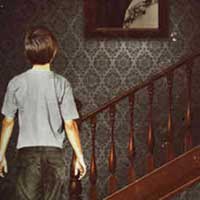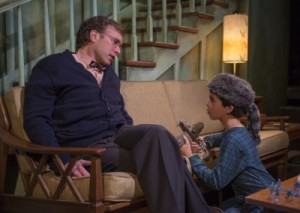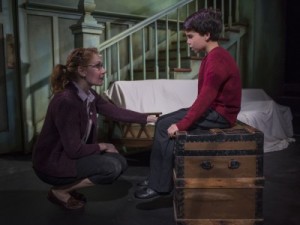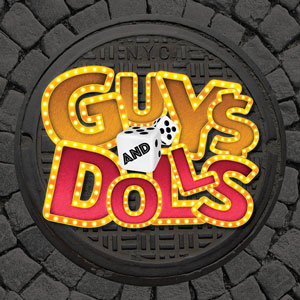
 [rating=3] The a atypical Chicago storefront performing space at The Profiles Theatre’s Alley Stage in which audience members observe the stage in traditional theatre seating but from opposite sides is ideal for the its production of David Mamet’s domestic nightmare “Cryptogram.” Such a set-up invites us into a 1959 living room where outstanding technical work (directed by Jacob Puralewski), particularly the set (Thaad Hallstein), costume (Raquel Adorno), and lighting design (Raquel Adorno), create a sense of a comfort, warmth, and even nostalgia that is constantly upset by Mamet’s script. Such incongruity ultimately brings out the play’s psychological and moral violence more than the actors’ performances which suffer from bad direction at least at the level of dialogue. With a staircase, couch, window, and door on the sides of the stage, we feel that we are observing some place real and warm, shielded from a terrible exterior world—an effect produced not only by Hallstein’s set, but some very sophisticated lighting design by Puralewski. Likewise, Adorno’s costumes are entirely appropriate for family-life even while the dialogue and interaction between the characters make it clear that something very inappropriate has happened. Although what precisely the impropriety is, and who is the culprit (though it is one of the three adults), remain the cryptogram of this work.
[rating=3] The a atypical Chicago storefront performing space at The Profiles Theatre’s Alley Stage in which audience members observe the stage in traditional theatre seating but from opposite sides is ideal for the its production of David Mamet’s domestic nightmare “Cryptogram.” Such a set-up invites us into a 1959 living room where outstanding technical work (directed by Jacob Puralewski), particularly the set (Thaad Hallstein), costume (Raquel Adorno), and lighting design (Raquel Adorno), create a sense of a comfort, warmth, and even nostalgia that is constantly upset by Mamet’s script. Such incongruity ultimately brings out the play’s psychological and moral violence more than the actors’ performances which suffer from bad direction at least at the level of dialogue. With a staircase, couch, window, and door on the sides of the stage, we feel that we are observing some place real and warm, shielded from a terrible exterior world—an effect produced not only by Hallstein’s set, but some very sophisticated lighting design by Puralewski. Likewise, Adorno’s costumes are entirely appropriate for family-life even while the dialogue and interaction between the characters make it clear that something very inappropriate has happened. Although what precisely the impropriety is, and who is the culprit (though it is one of the three adults), remain the cryptogram of this work.
As the play begins, a young boy, John (Aaron Lamm), speaks of his insomnia and an upcoming camping trip with his father to a family friend, Del (Darrell L. Cox) who apparently went on just such a trip with the boy’s father the week before. John’s mother, Donny (Abigail Boucher), enters and discusses a shared past with Del. It sounds like a love triangle between Del, Donny, and her husband, Robert, but it is never quite clear if the affair was between her and Del or Del and Donny’s husband. (It’s quite possible that Del had affairs with both Robert and his wife, Donny, as Donny clearly implies that she and Del had an affair together, but late in the play throws a homophobic epithet at him, not to mention the fact that he has just been on a bizarre camping trip alone with Robert in which they may have taught each other games and exchanged a knife). During their discussions, Donny scolds her young son, John, who keeps appearing in the living room where he is clearly not wanted. She frames his chronic insomnia as a refusal to obey bed-time, and ignores his complaints of hallucinations, his terror of hell, and his severe psychological and metaphysical disassociation. She does, however, take responsibility for a blanket that John feels guilty for rending offstage; assuring him, “we tore that long ago.” It is the blanket he was swaddled in.
The evidence is pretty strong that the impropriety here is sexual, and that John is the victim of abuse at the hands of one of these three adults. Apart from John’s tell-tale psychological symptoms, the torn swaddling blanket, an image with violent sexual overtones representing John’s shattered childhood, is coupled with that of a mysterious phallic knife that seems to have been acquired by John’s father, and passed around among the three adults in a manner that we are constantly, and desperately, being told defies reality. (Could that be some form of meta-symbol?) Add to this that John is being sent by his mother, Donny, to tidy the attic which she has “disturbed”, to the woods with his father by Del, and has clearly been damaged by the games and stories that these adults exchange among themselves and have taught him, and you have a pretty-iron clad case, but not against a specific character
Del’s position as a “family friend” and the early intimacy between him and John makes him suspect, but John’s jealousy over Del having gone to the woods with his father, Robert, points to Robert as the possible perpetrator. Could the fact that Del and Donny’s names are inverted in relation to their respective genders point to the fact that John’s mother could be sexually abusing him? After all, pedophilia is a crime rarely committed by women. Perhaps this is why she both rejects John’s pleas more violently than Del while still taking responsibility over the torn- blanket (At one point even speaking of “her guilt,” albeit in relation to something else). But then what do we make of the phallic-knife to which she, and ultimately Mamet’s script, will attach such large importance? In the final analysis, the perpetrator of the impropriety, which is almost certainly sexual in nature, remains a mystery, but the tragedy and horror of the play do not. All three adults, even John’s father who never appears onstage, ultimately dismiss John in their own way, insisting that their adult troubles are more real and important than John’s, ignoring both his terrible trauma and their culpability in it. The result will be truly horrific.
The acting here is in some ways quite strong: Abigail Boucher and Darrell W. Cox have created distinct characters that are very convincing as intimate friends-tied together with the never-seen Robert in a strange and unspeakable triangle, and who are simultaneously self-absorbed and haunted by guilt, but a guilt that is never directly acknowledged and fails to produce penitence and penance because it becomes part of that self-absorption. That said, with the exception of young Aaron Lamm’s extremely mature performance, the acting is dwarfed by the outstanding technical features of this production largely because it falls down at the level of delivery and dialogue. The actors speak their lines at rapid-fire pace even when there is absolutely no need. Even a cursory glance at Mamet’s script, with its constant instructions to the actors to pause, should have indicated to director Joe Jahraus that the violence of Mamet’s dialogue bears no relation to the velocity at which it is spoken (If anything, it’s important that we are given time and pauses to “hear” what is not being said). It comes instead from the constant interruptions between the characters, their refusal to deal with John’s experiences, and from the details we infer but which all three characters refuse to name. Ultimately, the rapid speed at which the lines are delivered by the actors significantly mars this production. We never get a chance to fully digest the horror of what is happening but not being said and tension is lost. Fortunately, Jahraus has taken advantage of the terrific space created by Thad Hallstein, and blocked the actors well. Nor can there be any doubt than Aaron Lamm flourished under his direction, giving an intense performance that conveys innocence, victimhood with a total absence of victimization, imagined guilt, and real desperation so powerfully that we are memorized, sympathize, and want to help, even as the adult characters refuse to acknowledge or relieve his plight. However, the ending, and here the fault lies with Jahraus, not Lamm, is too muted. There is so much ambiguity in the provenance of the play’s horror that the horror of the play’s ending itself should be made very clear. That said, I think even with the frustratingly understated final sequence, people will manage to get the point: we ignore the pain of others, especially children, and our own culpability in it, to the peril of their welfare and lives, and in contempt of our own consciences.
The Profiles Theatre is producing David Mamet’s “Cryptogram” at The Alley Stage located at 4171 N. Broadway through November 16th. Productions are Thursdays and Fridays at 8:00, on Saturdays at 5:00 and 8:00, and Sunday’s at 7:00. Tickets are available at listed between 20 and 40 dollars, and are available by calling 773-549-1815 or online at http://www.profilestheatre.org/cryptogram.html .
To see what others are saying, visit www.theatreinchicago.com, go to Review Round-up and click at “The Cryptogram”.
Running time 70 minutes. Parking is limited but findable and there is a city lot just two blocks away. Best bet-take the Broadway bus 36






More Stories
“Guys and Dolls”
“Dummy in Diaspora”
“The Magic School Bus: Lost in the Solar System”